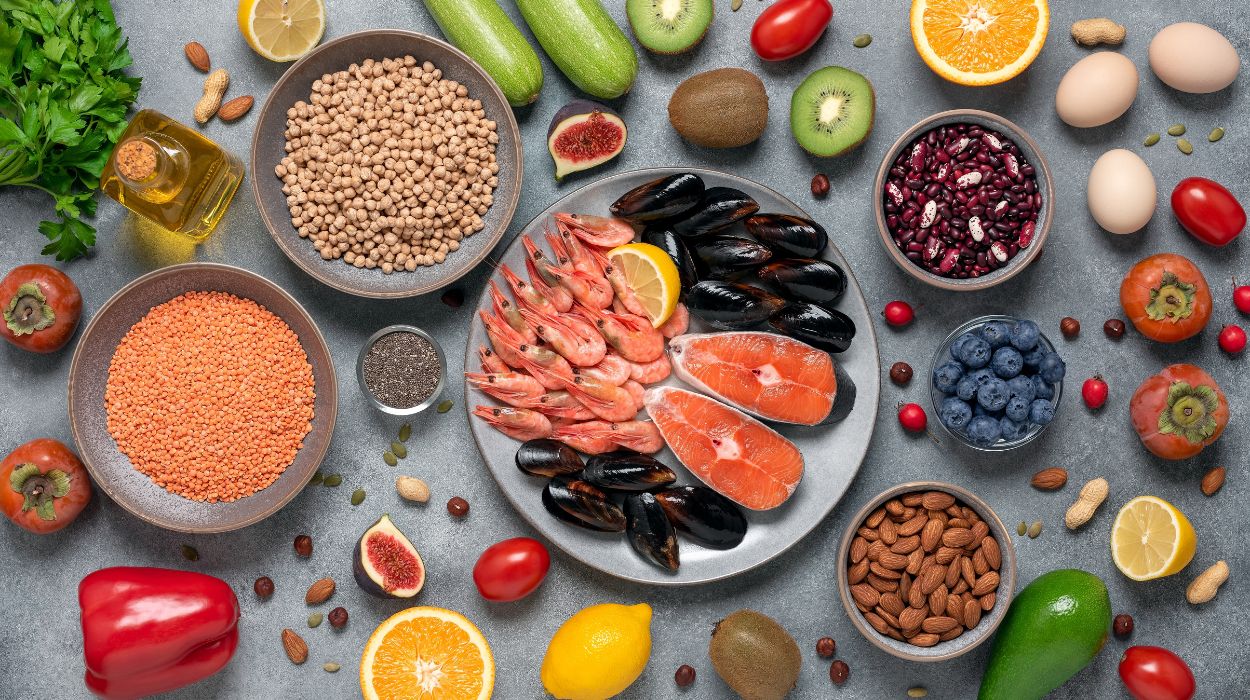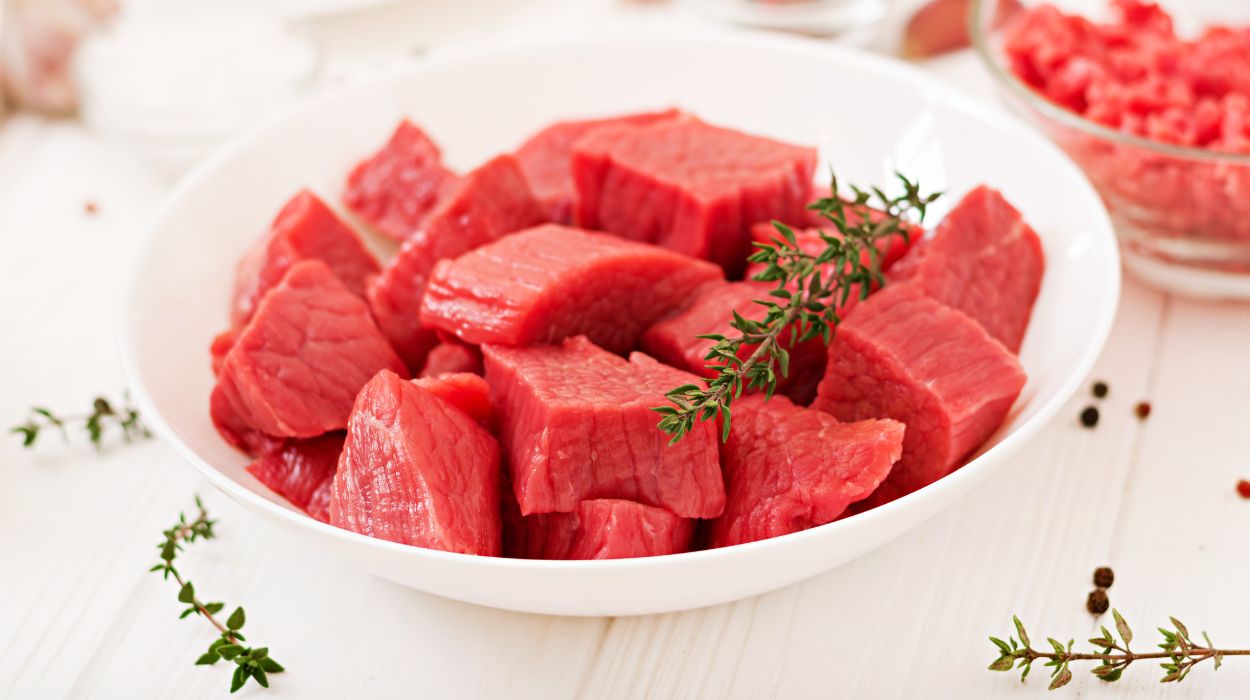 Expert's opinion
Expert's opinion
Expert's opinion
The article is a subjective view on this topic written by writers specializing in medical writing.
It may reflect on a personal journey surrounding struggles with an illness or medical condition, involve product comparisons, diet considerations, or other health-related opinions.
Although the view is entirely that of the writer, it is based on academic experiences and scientific research they have conducted; it is fact-checked by a team of degreed medical experts, and validated by sources attached to the article.
The numbers in parenthesis (1,2,3) will take you to clickable links to related scientific papers.
Pescatarian Diet: Pros, Cons, Food List & Sample Meal Plan 2024

Pescatarianism is a popular alternative to a traditional vegetarian diet or plant-based eating. It involves abstaining from all meat and poultry but allowing seafood into the mix. As with any diet, it’s essential to understand what it involves, the possible benefits, and the pros and cons before you decide if it’s right for you.
In this article, we will look at the pescatarian diet’s advantages and disadvantages in detail, its potential health benefits; possible risks; environmental impact; and more.
Pescatarian Diet Sample Meal Plan For A Day
Sample Pescatarian Diet Plan
Some pescatarian meal ideas that will provide a balanced range of nutrients throughout your day include various seafood sources of animal protein, plus healthy fats and plenty of fiber! However, if you cannot cover all your nutritional bases, it may be worth supplementing with a good multivitamin to fill in any gaps. An example of a nutritious meal plan could be:
Breakfast: Nutty Banana Toast (Approx. 505 Calories) Or Veggie Egg White Omelet (Approx. 122 Calories)
Starting the day with whole-grain toast topped with nut butter and banana provides a satisfying and nutritious breakfast. Whole grains offer complex carbohydrates for sustained energy, while nut butter adds healthy fats and protein. Bananas are rich in potassium and fiber, supporting heart health and digestion. This breakfast option aligns with the Pescatarian Diet by offering a plant-based source of protein and essential nutrients.
| Nutty Banana Toast | |
| Whole grain toast | Two slices |
| Nut butter | Two tablespoons |
| Chopped banana | One medium |
| Calcium-rich skim milk or fortified almond milk | One cup |
For those avoiding eggs, an egg white omelet packed with colorful veggies like red peppers, onions, and mushrooms offers a protein-rich start to the day. This option provides a variety of vitamins, minerals, and antioxidants, supporting overall health and vitality. It aligns with the Pescatarian Diet by focusing on plant-based ingredients and lean protein sources.
| Alternative: Veggie Egg White Omelet | |
| Egg white | Three egg whites |
| Diced red peppers | A quarter cup |
| Diced onion | A quarter cup |
| Sliced mushrooms | A quarter cup |
| Olive oil (for cooking) | One teaspoon |
Lunch: Tuna Avocado Salad (Approx. 538 Calories)
Tuna salad with spinach or kale, avocado, and tomatoes offers a nutrient-dense meal rich in omega-3 fatty acids, protein, and fiber. Tuna is a lean source of protein and provides essential nutrients like selenium and vitamin D. Spinach and kale are nutrient powerhouses, offering vitamins A, C, and K, as well as folate and iron. Avocado adds heart-healthy fats, while tomatoes provide additional vitamins and antioxidants. This lunch option is in line with the Pescatarian Diet by featuring fish as a primary protein source and incorporating a variety of nutrient-rich vegetables.
| Lunch | |
| Tuna | Three ounces |
| Olive oil | One tablespoon |
| Spinach or kale | Two cups |
| Sliced avocado | A quarter fruit |
| Diced tomatoes | Half a fruit |
| Segmented oranges | One medium |
| Diced apples | One medium |
| Halved grapes | Half a cup |
Dinner: Grilled Salmon Quinoa Bowl (Approx. 400 Calories)
Grilled salmon served over quinoa with steamed broccoli offers a balanced and flavorful dinner option. Salmon is high in omega-3 fatty acids, which support heart health, brain function, and inflammation reduction. Quinoa is a protein-rich grain that provides essential amino acids, while fresh herbs like basil or oregano add flavor and antioxidants. Steamed broccoli is rich in fiber, vitamin C, and other essential nutrients, making it a perfect complement to the meal. This dinner aligns perfectly with the Pescatarian Diet by featuring seafood as the main protein source and incorporating whole grains and vegetables.
| Dinner | |
| Grilled Salmon | Four ounces |
| Cooked quinoa | Half a cup |
| Chopped fresh herbs (basil or oregano) | One tablespoon |
| Steamed broccoli | One cup |
Snacks: Hummus Crunch And Trail Mix Boost (Approx. 308 Calories)
Hummus with carrot and celery sticks provides a satisfying and nutritious snack option. Hummus is made from chickpeas, offering plant-based protein, fiber, and essential nutrients like iron and magnesium. Carrot and celery sticks are low-calorie, crunchy vegetables rich in vitamins, minerals, and antioxidants. Trail mix made with walnuts, dried cranberries, and pumpkin seeds offers a satisfying blend of protein, healthy fats, and fiber, making it a perfect on-the-go snack. These snack options align with the Pescatarian Diet by focusing on plant-based foods and incorporating nutrient-dense ingredients.
| Snack | |
| Hummus | Two tablespoons |
| Sliced carrots | One cup |
| Sliced celery | One cup |
| Trail mix (combination of walnuts, dried cranberries, and pumpkin seeds) | A quarter cup |
In addition to eating nutritious meals regularly, it is also important to stay hydrated throughout the day by drinking plenty of fluids such as water or herbal tea. Staying active by doing regular exercise is also vital in maintaining overall health and well-being.
What Is A Pescatarian Diet?
A pescatarian diet is a type of eating plan that includes eating fish and other sea or river foods but no other meat. People who follow this diet don’t eat red meat, poultry, and eggs but can enjoy fish, shellfish, squid, and other sea creatures like octopus or crawfish.
It’s also common for pescatarians to eat dairy products such as cheese and yogurt as well as plant foods like fruits, vegetables, nuts, and whole grains. When done correctly, it is a healthy diet; but like all diets, there is a broad spectrum of possibilities, and it is conceivable to be unhealthy if you eat a lot of junk food on this diet.
A huge benefit of following this type of eating plan is that it provides plenty of protein without the saturated fat[1] in red meat or poultry. It also tends to be lower in calories while still providing plenty of essential vitamins and minerals needed for optimal health, including B12, which is mainly found in animal sources.
In addition to the health benefits of this eating style, there are some environmental advantages too, as land-based meats require large amounts of energy for production into the final edible product.
Benefits Of A Pescatarian Diet
This type of lifestyle has become increasingly popular due to its various health advantages,[2] including weight loss, better heart health, and improved cognitive functioning.
Aids Weight Loss
A pescatarian diet may aid weight loss. Studies have shown[3] that those who follow a diet with plenty of vegetables and lean protein consume fewer calories because they avoid high-calorie foods like red meats.
Since protein sources like fish are considered low-energy-density foods,[4] they can make you feel full without consuming many calories at once. Furthermore, the omega-3 fatty acids found in some types of seafood — such as salmon — have been linked to decreased risk of obesity.[5] Other diets that might be effective for losing weight include plant-based diets for weight loss.
Improved Heart Health
In addition to promoting weight loss, the omega-3 fatty acids found in fish can also improve overall heart health[6] by lowering blood pressure levels and reducing inflammation in the body — both of which are associated with reduced risk for cardiovascular disease.
Research indicates that certain types of seafood also contain beneficial compounds like taurine and eicosapentaenoic acid that can help lower cholesterol levels[7] and improve the functioning of blood vessels.
Improved Cognitive Function
Finally, eating seafood may also help prevent cognitive decline[8] thanks to the high vitamin B-12 found in some types of seafood. Vitamin B-12 is an essential B vitamin that can help protect against age-related memory decline by keeping neurons healthy; it also plays an important role in energy production and is vital for neurological function.
Additionally, omega-3 fatty acids found in fresh fish have been linked to improved mental clarity[9] and enhanced performance on various tests related to learning speed and accuracy.
Possible Downsides Of A Pescatarian Diet
Like any other eating plan, pescetarianism also has its downsides, particularly if you have a junk-heavy diet. Here are some of the possible disadvantages associated with a pescatarian lifestyle.
Risk Of Nutrient Deficiencies
Fish and seafood are rich in protein and essential fatty acids but lack specific vitamins and minerals found in other food sources, such as the iron in red meat.[10] To make up for these deficiencies, people need to supplement their diets with fortified foods or take vitamin supplements, just as they would with a vegan diet.
High In Mercury
Some fish and other seafood may contain levels of mercury[11] that could be harmful if consumed in large quantities over time. Mercury can accumulate in the body and is present in larger fish such as salmon and tuna. If you are concerned, eating smaller fish that do not contain nearly as much mercury is better.
Environmental Concerns
Many parts of the aquatic world have been overfished due to the demand for seafood.[12] This problem has led to specific fish populations declining which could cause ecological disruptions if left unchecked. Large-scale fisheries tend to employ intensive techniques that involve pulling massive nets filled with indiscriminate species from the sea, which can harm marine life and damage reefs.
As a result, pescatarians must pay close attention to where their seafood originates from to ensure ethical sourcing methods are being used whenever possible.
Local fish advisories[13] should also be adhered to. These are important tools used by government agencies to inform and protect citizens from the health risks associated with consuming contaminated fish. By monitoring water quality, pollutants, and toxins in the water, these advisories help to protect people from potential foodborne illnesses such as mercury poisoning and other contaminants.
Local fish advisories are an important component of protecting public health, enabling people to make informed decisions about where and what type of seafood they should consume.
Cost
The cost of maintaining a pescatarian diet[14] may also be an issue for some individuals since many types of fish and seafood tend to be more expensive than other protein sources and more expensive than a vegetarian diet. The price difference between these foods reflects their availability — seafood is much harder to access if it comes from international markets or if it is frozen for transportation purposes. This lack of easy availability can make it challenging for those on tight budgets who want to follow a pescatarian lifestyle.
Limiting Options In Some Areas
Many dining establishments[15] focus on serving meals with land mammal-based proteins rather than dishes featuring fish and seafood or vegan and vegetarian options. This means people who choose this type of lifestyle will often have less variety when eating out compared to omnivores.
Pescatarian Diet Food List: Food To Eat And Avoid
When following a pescatarian diet, it is essential to focus on the types of foods consumed and understand why certain foods are better than others. Eating various nutrient-dense foods is essential for obtaining necessary macro and micronutrients and promoting overall health. Oh, and skip the deep-fried fish sticks.
Foods To Eat

Fish and seafood should be the primary protein sources[16] for pescatarians. Omega-3 fatty acids, vitamins, minerals, and essential amino acids can all be found in fatty fish such as salmon, tuna, sardines, and mackerel.
Consuming fish and other types of seafood, such as oysters or mussels, provides healthy fats that our bodies need for proper functioning.
Fruits, vegetables, and grains are staples in both pescatarian and plant-based diets. Whole grains such as quinoa and oats provide complex carbohydrates that fuel our bodies with energy while also providing some fiber which helps regulate digestion. A wide variety of fruits and vegetables contain vitamins and minerals that promote health and well-being, so it is essential to include these in meals regularly.
Foods To Avoid

Red meat should be avoided when following a pescatarian diet because it has been linked with an increased risk of chronic diseases[17] such as heart disease and cancer due to its high saturated fat content. Processed meats are also considered unhealthy because they may contain added preservatives like nitrates that have been linked[18] with an increased risk of colon cancer risk.
Dairy products should be limited or avoided altogether if you suffer from lactose intolerance or a cow’s milk allergy. However, suppose it is just a lactose intolerance you suffer from. In that case, you can easily take the enzyme lactase to break down the milk sugar lactose and avoid the unpleasant side effects associated with this sugar intolerance.
It is also important to remember that just because something sounds healthy doesn’t mean it is. Packaged and processed junk food is still junk food even if the label might read vegetarian or vegan. Always get to know your brands and ingredients, so you do not add unnecessary sugars, hydrogenated fats, and oils to your pescatarian diet.
Summary
Nutritionally, pescetarianism offers many benefits. Seafood is high in beneficial omega-3 fatty acids, which have been linked to improved heart health and brain function. Additionally, the absence of land animals from the diet can reduce one’s exposure to saturated fats and cholesterol, both of which are associated with an increased risk of cardiovascular disease.
Pescatarianism is a dietary lifestyle choice that may be the perfect middle ground for people looking to reap the health benefits of both vegetarian and non-vegetarian meals. A fish eater’s diet consists of plant-based foods, such as fruits, vegetables, grains, nuts, seeds, and legumes, along with oily fish, which is ideal for people who are trying to reduce their consumption of animal-based foods but still want the essential nutrients that may not be available in a strictly vegetarian diet.
+ 18 sources
Health Canal avoids using tertiary references. We have strict sourcing guidelines and rely on peer-reviewed studies, academic researches from medical associations and institutions. To ensure the accuracy of articles in Health Canal, you can read more about the editorial process here
- Bowman, S.A. (2020). A Vegetarian-Style Dietary Pattern Is Associated with Lower Energy, Saturated Fat, and Sodium Intakes; and Higher Whole Grains, Legumes, Nuts, and Soy Intakes by Adults: National Health and Nutrition Examination Surveys 2013–2016. Nutrients, [online] 12(9), p.2668. doi:10.3390/nu12092668.
- Wozniak, H., Larpin, C., de Mestral, C., Guessous, I., Reny, J.-L. and Stringhini, S. (2020). Vegetarian, pescatarian and flexitarian diets: sociodemographic determinants and association with cardiovascular risk factors in a Swiss urban population. British Journal of Nutrition, [online] 124(8), pp.844–852. doi:10.1017/s0007114520001762.
- Tapsell, L.C., Batterham, M.J., Thorne, R.L., O’Shea, J.E., Grafenauer, S.J. and Probst, Y.C. (2014). Weight loss effects from vegetable intake: a 12-month randomised controlled trial. European Journal of Clinical Nutrition, [online] 68(7), pp.778–785. doi:10.1038/ejcn.2014.39.
- Mendivil, C.O. (2021). Fish Consumption: A Review of Its Effects on Metabolic and Hormonal Health. Nutrition and Metabolic Insights, [online] 14, p.117863882110223. doi:10.1177/11786388211022378.
- Tørris, C., Molin, M. and Cvancarova, M.S. (2016). Lean fish consumption is associated with lower risk of metabolic syndrome: a Norwegian cross sectional study. BMC Public Health, [online] 16(1). doi:10.1186/s12889-016-3014-0.
- Chaddha, A. and Eagle, K.A. (2015). Omega-3 Fatty Acids and Heart Health. Circulation, [online] 132(22). doi:10.1161/circulationaha.114.015176.
- Guo, Q., Zhang, L., Yin, Y., Gong, S., Yang, Y., Chen, S., Han, M. and Duan, Y. (2022). Taurine Attenuates Oxidized Fish Oil-Induced Oxidative Stress and Lipid Metabolism Disorder in Mice. Antioxidants, [online] 11(7), p.1391. doi:10.3390/antiox11071391.
- Soh, Y., Lee, D.H. and Won, C.W. (2020). Association between Vitamin B12 levels and cognitive function in the elderly Korean population. Medicine, [online] 99(30), p.e21371. doi:10.1097/md.0000000000021371.
- Derbyshire, E. (2018). Brain Health across the Lifespan: A Systematic Review on the Role of Omega-3 Fatty Acid Supplements. Nutrients, [online] 10(8), p.1094. doi:10.3390/nu10081094.
- Henjum, S., Groufh-Jacobsen, S., Stea, T.H., Tonheim, L.E. and Almendingen, K. (2021). Iron Status of Vegans, Vegetarians and Pescatarians in Norway. Biomolecules, [online] 11(3), p.454. doi:10.3390/biom11030454.
- Bernhoft, R.A. (2012). Mercury Toxicity and Treatment: A Review of the Literature. Journal of Environmental and Public Health, [online] 2012, pp.1–10. doi:10.1155/2012/460508.
- Sumaila, U.R. and Tai, T.C. (2020). End Overfishing and Increase the Resilience of the Ocean to Climate Change. Frontiers in Marine Science, [online] 7. doi:10.3389/fmars.2020.00523.
- Nps.gov. (2022). Fish Consumption Advisories – Fish & Fishing (U.S. National Park Service). [online] Available at: https://www.nps.gov/subjects/fishing/fish-consumption-advisories.htm.
- Love, D.C., Thorne-Lyman, A.L., Conrad, Z., Gephart, J.A., Asche, F., Godo-Solo, D., McDowell, A., Nussbaumer, E.M. and Bloem, M.W. (2022). Affordability influences nutritional quality of seafood consumption among income and race/ethnicity groups in the United States. The American Journal of Clinical Nutrition, [online] 116(2), pp.415–425. doi:10.1093/ajcn/nqac099.
- Alcorta, A., Porta, A., Tárrega, A., Alvarez, M.D. and Vaquero, M.P. (2021). Foods for Plant-Based Diets: Challenges and Innovations. Foods, [online] 10(2), p.293. doi:10.3390/foods10020293.
- Chen, J., Jayachandran, M., Bai, W. and Xu, B. (2022). A critical review on the health benefits of fish consumption and its bioactive constituents. Food Chemistry, [online] 369, p.130874. doi:10.1016/j.foodchem.2021.130874.
- Qian, F., Riddle, M.C., Wylie-Rosett, J. and Hu, F.B. (2020). Red and Processed Meats and Health Risks: How Strong Is the Evidence? Diabetes Care, [online] 43(2), pp.265–271. doi:10.2337/dci19-0063.
- Karwowska, M. and Kononiuk, A. (2020). Nitrates/Nitrites in Food—Risk for Nitrosative Stress and Benefits. Antioxidants, [online] 9(3), p.241. doi:10.3390/antiox9030241.



